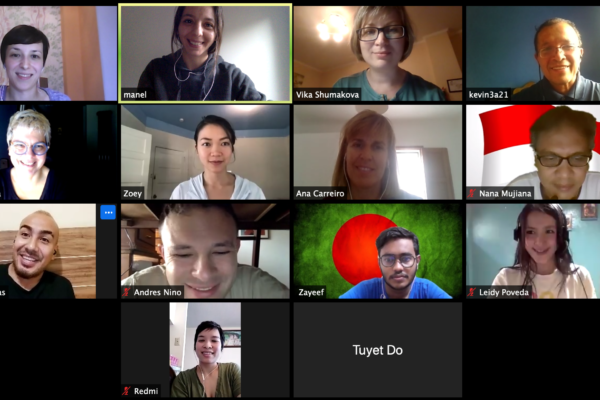When you learn English or a new skill, there’s always something you wish you had known before.
Ideally, you’d like to have someone who could share with you some shortcuts.
Nowadays, you can find such a person on the internet or YouTube. But when I started learning English there wasn’t Youtube and the internet wasn’t that developed.
So my journey to fluency was a bit longer.
I‘ve written this to help other English learners to learn from my mistakes and avoid them.
1. Pronunciation
Sure there are some ‘terrible’ English words in terms of pronunciation like ‘queue’, ‘choir’, ‘squirrel’, or ‘Worcestershire’. But in general, you kinda get it. Like what’s the problem with the words ‘ten’ or ‘name’?
Like many learners, I wasn’t very worried about the pronunciation. Grammar was my nightmare.
We didn’t spend too much time with pronunciation at school, or at university (that wasn’t linguistic) or in the courses.

Sure teachers corrected our pronunciation and we learned ‘first, second and third rules of reading’.
But they were more concerned about our grammar, vocabulary, and reading skills. We learned more words, more sentences, read more but we didn’t work on pronunciation in general.
I had a phonetics class only in a linguistic university. Once I pronounced the word ‘curtain’ as ‘kErtein’. The teacher was like “What?” and looked at me like: ‘Are you mad?’
I wasn’t mad. I was unaware.
In these classes, we learned English sounds with charts and transcriptions, examples of words, and the tape with recordings. We were supposed to imitate it.
And it wasn’t easy. I mean you can understand how to produce [i] as in ‘me’ but what to do with [æ] as in ‘cat‘ or [ɜː] as in ‘burn’?
I managed to produce these sounds to pass an exam but just right after I switched to my old pronunciation.
Everything changed when I came across Hadar Shemesh, an accent coach, and a YouTuber.
She breaks down English words and explains what exactly should happen in your mouth when you produce them. With her explanations, it’s much easier to distinguish and produce those sounds.
If I knew about her earlier my English could have been much better!
THE LESSON: English is not a phonetic language: the words sound different from how they are written. It’s crucial to start with pronunciation.
2. Mistakes
We all had classmates who were not good in English or in math and made so many mistakes that they were labeled as losers or dummies. And we definitely didn’t want to be them.
Even when we become adults and leave a school and a university, we still have this concept: if we make mistakes we are probably not good enough at it. So it’s better to quit. So we quit.
I had another issue. I wasn’t bad at English and I got used to good marks. But when I didn’t understand something I left it as it is. I didn’t want to improve. I was afraid of making more mistakes.
That led to one of the biggest failures in my life: I didn’t enter the university, the Faculty of Foreign Languages.
I failed both: the oral exam and the grammar test. I felt like a total loser and instead of trying again I just quit.
For me, my fiasco was proof that ‘I was not good at English and I would never be’. So I just quit.
But the truth is that you can’t do only things in which you’re good at.

Sometimes in order to be good at something you need to start from what you have, from being bad at it. And it’s okay.
As a famous American screenwriter David Mamet said: ‘At some point, you’re gonna say, okay, it’s gonna be bad. You got to stand being bad If you want to be a writer. Because if you don’t you’re never gonna write anything good’.
It’s the same with English. Sometimes we wait for our grammar to improve and our knowledge to increase in order to start speaking/writing with perfect English.
But all we need to do is start speaking or writing even if we’re bad at it. Even if you make mistakes. It’s the only way to learn.
As non-native speakers, we think that we can’t detect our mistakes, that we need a teacher or a native speaker who will correct us.
But we can.
Since I started making videos and recordings and simply speaking English almost daily I started noticing my mistakes. Eventually, I made fewer and now I can even correct myself while speaking.
However, in order to start this process, you need to start speaking. Speaking with mistakes.
THE LESSON: Mistakes are the only way to learn, don’t be afraid of them. Accept them and keep speaking, writing, reading in English.
3. Speaking with native and non-native speakers
When you start learning English or any other language you automatically assume that the best ‘teachers’ are native speakers as they know better.
Sure it’s the best reference and if you’re not sure how to write or say something you need go to a dictionary or simply google it and see how they use it.
But in communication, it’s not always the case. If it’s a teacher or a linguist, of course, they will give you the best answer.
But let’s be honest. How many native teachers and linguists will agree to talk with English learners for free? Especially if we live in a non-English speaking country where there are not so many of them.
At the same time, there’s a bunch of non-native speakers out there. Many of them live in English speaking countries and use English on a daily basis.

Yet we’re mostly looking for ‘native speakers’ because ‘they are the best’.
I did the same. I also believed that ‘you can pick up mistakes from non-native speakers’.
In reality, it’s not about speakers but about your awareness and desire to speak without mistakes.
The most important thing is that we can only develop our speaking skills if we speak constantly. It doesn’t matter who with (even with ourselves).
Our skills develop as we use them. Our brain doesn’t care who we speak English with; it only sees if we use the skill or not. And if you don’t, it forgets all the knowledge and structures you know.
When we stop evaluating speakers based only on their origin, we’re able to find so many interesting, smart, creative speakers we can speak to, practice, and improve with. (Here’s an article about how to develop speaking skills online).
THE LESSON: Look for “a great English speaker” not for “a native speaker“.
4. Compound effect
When you think about English in adult age you often see it as an endless ocean of knowledge, culture, and experience.
You think that you need hours and years to learn the language and you just don’t have these hours and years.
In most cases, you need to work 8 hours a day, 40 a week and if you have kids you definitely won’t have a lot of time for English.
It’s true. Most of us don’t have much time to master English or any other language.
But we don’t need so much time every day.
All we need is 10-30 min a day to start doing something in this direction and do it daily for as long as we can.
So, yes, we need hours and years to master English but we have those hours and years as long as we are alive. There’s no need to spend them all at once. Give yourself ‘a time credit’.
If you spend 30 min a day learning English (any aspect of it), in a week it will be 3,5 hours, in a month it will be 14 hours, in 3 months it will be 42 hours, in a year it will be 168 hours or 21 days, in 2 years it will be 336 hours or 42 days, etc.
And you can always find 30 minutes no matter how busy you’re.
If you can find more, 1 hour a day, the whole amount of hours and days will multiply.
This is a compound effect: small daily actions that lead to great results.

Most of us have experienced the power of the compound effect in various areas of our lives. When you do something consistently even without seeing results but in a period of months or years you’ll definitely see them.
The best example is with workouts. First, it’s painful and you don’t like it so much. But in the end, it becomes a part of your life and you feel so much better physically and emotionally.
It works with English as well. And I experienced it.
When I made one video a day during the Fluency Challenge by the end of the 18-day race I felt much more confident in speaking.
Months later, after speaking English on a weekly basis, I started noticing my mistakes. My immersion in English increased dramatically and also the time I spent speaking in English.
When I started the Lingoda marathon I wasn’t a very good reader. In the middle of this 90-days-challenge I became much better. All I did was read a tiny paragraph out loud almost every day.
THE LESSON: use the power of the compound effect.
(Want to know more about Compound Effect in English? Read this)
5. Passive Watching VS Learning English
I binged on TV Series in English several years ago. I watched a lot of them: the old one, the new one, everything.
My listening comprehension developed a lot, that’s for sure.
And here’s the thing. When you watch a lot of films and videos in English you become aware of English speech patterns, the way they communicate, the common expressions and words they use.
Eventually, these words become familiar to you. And think that you know them, that you’re educating yourself by watching.
But you’re not.
You’re just developing your listening comprehension and enjoying movies. That’s all.
You’re a passive viewer.
In order to learn something from the TV series you need to get those scripts, take out new words and expressions, learn them and start using them.

One more thing about subtitles.
They are helpful at the beginning. But if you understand 60-80% of the movie it’s better to skip them.
Because when you watch with subtitles you stop listening and in some cases even watching, you just read the subs.
When you know that there will be subs you stop trying to understand what the actors are saying.
The best practice, in my opinion, is to turn off the subs and turn them on only when you don’t understand what people are saying.
THE LESSON: don’t be a passive viewer! Take those scripts and learn new words and expressions!





Way to gooooooooo Vika!!!
You’re the BEST ???
Hey Marwa, no, you’re the best! We should create something together! and thank you for your support! I’m so grateful you can’t even imagine.
While reading this post I recognized myself in it. My learning of the English Language was slow and discontinuous. There was a time during which I didn’t read nor watch anything in English. For the last 2 years I have been practicing again and I feel that all my “old knowledge” is coming back to memory. One thing I know for sure: I want to improve and the more the better. And now I know that practice and commitment are the keys.
I’m posting this comment here since I read Vika’s and I admire her commitment and love for the English language and I also admire how well she understands and speaks without having never lived in an English speaking country .
Hey Rosa, thank you for stopping by and writing this beautiful comment. Your sentence “While reading this post I recognized myself in it” just made my day. I can’t thank you enough for your words. I hope you’ll find more and more use in the website.
it’s nice to hear about ur fluency journey ma’am..i have started my journey on learning eng since june onwards n i have been going through the same situation that u hv mentioned.. i had learned english at my school, college but not in the way that is needed for communication.. i am doing my graduation but after hearing hadar n you,now i dont think its too late to learn. i have made commitment to myself that i wont give up untill mastering the language.yeah i watch a lot on utube but sometimes it makes me confused where to start wth.then i came across hadar’s channel on utube and i was a part of the new sound of english,n i got the half scholarship but i couldn’t make the use of that offer. inspite of that i became a little more confident n i hv joined the influency community and there are a lot of wonderful member doing their activities. but it seems like i am losing my confidence again bcz i think I am late to join the community n i feel so puzzled there.for that i hv started practicing wth my frnds on messenger, nd still making a lot of mistakes, but trying to learn from those mistakes. wholeheartedly i want to practice wth the ppl all over the world. now i hv come across you where i can be a part of this website from the beginning. plz dont get me wrong if i said anything wrong…thank you, i am feeling relieved sharing this with you.❤
Hey Sumona, first of all thank you for taking time to write such a long comment. I truly appreciate it. I’ve just sent you access to Hadar’s Pronunciation Workshop.
As for InFluency, it’s an incredible community, the best I ever seen.
It’s never late to be a part of it. Join our Speaking Club and participate in activities you like) And of course I’m also glad to see you here))
I like it !
your writing style is amazing, I enjoy every single sentence , I didn’t feel bored.
Your advices are very important and useful, thank you .
I hope you continue writing such an incredible articles.
Thank you, WIssal! I feel even more motivated)
Vika,
So beautiful. You make great posts about quitting if we think we are not perfect. I still vividly remember a moment of my life right before I started first grade. I was so excited and turned to my father: “I’m gonna be a good student. I’m only gonna have As and Bs,” I said. My eyes were sparkling. But he looked at me and replied: “No, you are only gonna have As.” Now, even then my little brain knew that it’s impossible to have only As all the time. So right then and there I quit. I had quit before I started. I was one if the worse students through all of my school years back in Bulgaria. It was only when I left and went to live abroad that I began to change my thinking. You are right, we don’t have to classify ourselves as being “good” or “bad” at something. We can just try and work hard. The results will follow. Your English is fantastic and you write beautiful pieces. Can’t wait to read more.
Dear Daniela, thank you so much for your kind words and support! It means a lot to me. Thank you for sharing your experience, I hope we’ll also collaborate and create many useful pieces together)) I’m eager to tell about such a great English learner and English teacher as you are.
Hi, Vika!
First of all, let me congratulate you with a new huge achievement in your English and professional journey!
Your website is terrific, and you should be very proud of yourself!
While I was reading your article, I couldn’t hold my smile back. Why? Because I’m familiar with all the points of it. I used to avoid pronunciation practice, I was a passive viewer, and I was afraid of making mistakes. I have to confess, that during the last year I wasn’t learning English. I mean, taking a few paid courses, following several YouTubers didn’t level up my knowledge. In some points yes, but not in general. I was supposed to be active, consistent, and patient.
Before this summer I’d been struggling with myself, my mindset, and my procrastination.
The turning point happened two months ago, when I joined a 14-days English challenge. I was full of beans during those two weeks.
Have I overcome everything that prevents me from succeeding? Definitely, I’ve made a step forward in comparison with the last year, but I’m still reluctant to do pronunciation drills and chunks.
Thank you so much for sharing your deep insights! Your writing style is marvelous!
Hey Vladimir,
Thank you so much for your beautiful comment and for sharing your experience.
It’s so-so true about passive learning and inability to take actions.
I’m so glad that you’re changing your habits and you’re aware of them. That’s the best way to keep ourselves motivated.
See you!
Iam very happy to you Vika because you can achive one of your dreams and being fluent in english. and I can imagine how you struggling and parcticing alot of hours to satisfaction yourself. and the best thing in the journey is roadway not the end. and I hope your motivation to being fluent in english can helping you in your live to achive all your dreams. and I think all our problems in english because we didnt spoke english alot of time and didnt work on our pronuncition in english. it makes it sometimes vary hard to speaking english. but I think after speaking every day in a vedio or make voice rocorder on our phons like you said in your article that will break the wall of spekaing. and thank you very much for your motivation.
Thank you!